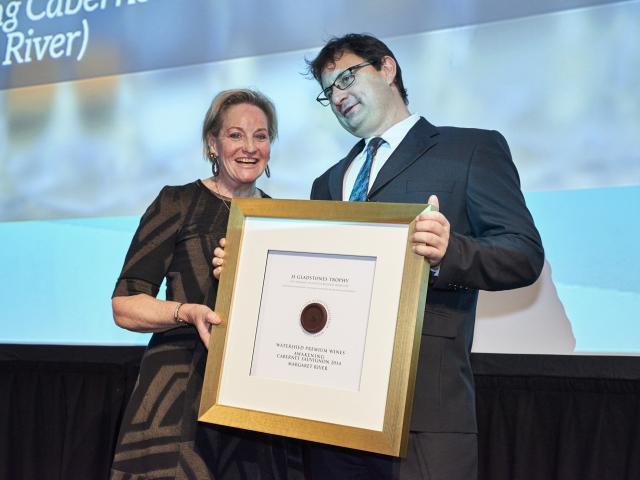Margaret River Cabernet wins Gladstones Trophy

A Cabernet Sauvignon from Margaret River has won the JS Gladstones Trophy at the Wine Show of WA awards dinner for the wine showing the best and most distinctive regional character.
The trophy celebrates excellence in winemaking and recognises the contribution of former Department of Agriculture and University of Western Australia scientist, Dr John Gladstones, who identified the Margaret River region as the most suitable in Australia for viticulture and high quality wines.
Watershed Premium Wines 2014 Awakening Margaret River Cabernet Sauvignon took out the prestigious trophy, sponsored by the Department of Primary Industries and Regional Development, from a field of 12 finalists.
Department researcher and trophy tasting panel member, Glynn Ward, said the Margaret River Cabernet Sauvignon was recognised for showing the best expression of both the variety and region it represents.
“The 2014 Awakening Cabernet Sauvignon was harvested at optimum maturity with intense flavour and a deep-red/crimson-tinged colour,” Mr Ward said.
“The wine had complex blackcurrant, cassis, liquorice and hints of cigar box flavours, and velvety texture with fine tannins that are distinctive of Cabernet Sauvignon from the Margaret River region.
“It is a credit to the winemakers, Severine Logan and Conrad Tritt.”
Regional character is an important factor in marketing fine wine, particularly in taking full advantage of new export growth and wine-related tourism opportunities.
Mr Ward said the right variety and clone, grown in the right climate, region and site, create a perfect match.
“The production of fine wines in our nine diverse winemaking regions provides flow-on economic benefits from wine and food tourism in Western Australia,” he said.
“The department’s grape and wine team helps ensure the quality and distinctive character of WA’s wines continues to improve through research in new varieties, and better clones and winemaking techniques.
“Team members also work closely with the wine industry to assist producers to take full advantage of export growth opportunities.”
